Sustainable Food Industry: Legislation, Waste Management & Case Study
VerifiedAdded on 2023/06/09
|14
|3945
|266
Report
AI Summary
This report examines the critical need for sustainability in the food industry, highlighting its environmental impact and the importance of adopting sustainable practices. It focuses on key UK and EU environmental legislation, such as the Waste Framework Directive and the Landfill Directive, that drive sustainable initiatives in waste management and carbon reduction. The report also discusses other key drivers, including the Courtauld Commitment and the Hospitality and Food Service Agreement, which promote and encourage sustainable practices within public and commercial organizations. Furthermore, it explores how the food industry is managing water usage, energy consumption, and waste management sustainably, with a focus on achieving zero waste to landfill and embracing the circular economy, using examples from various sectors of the food industry.
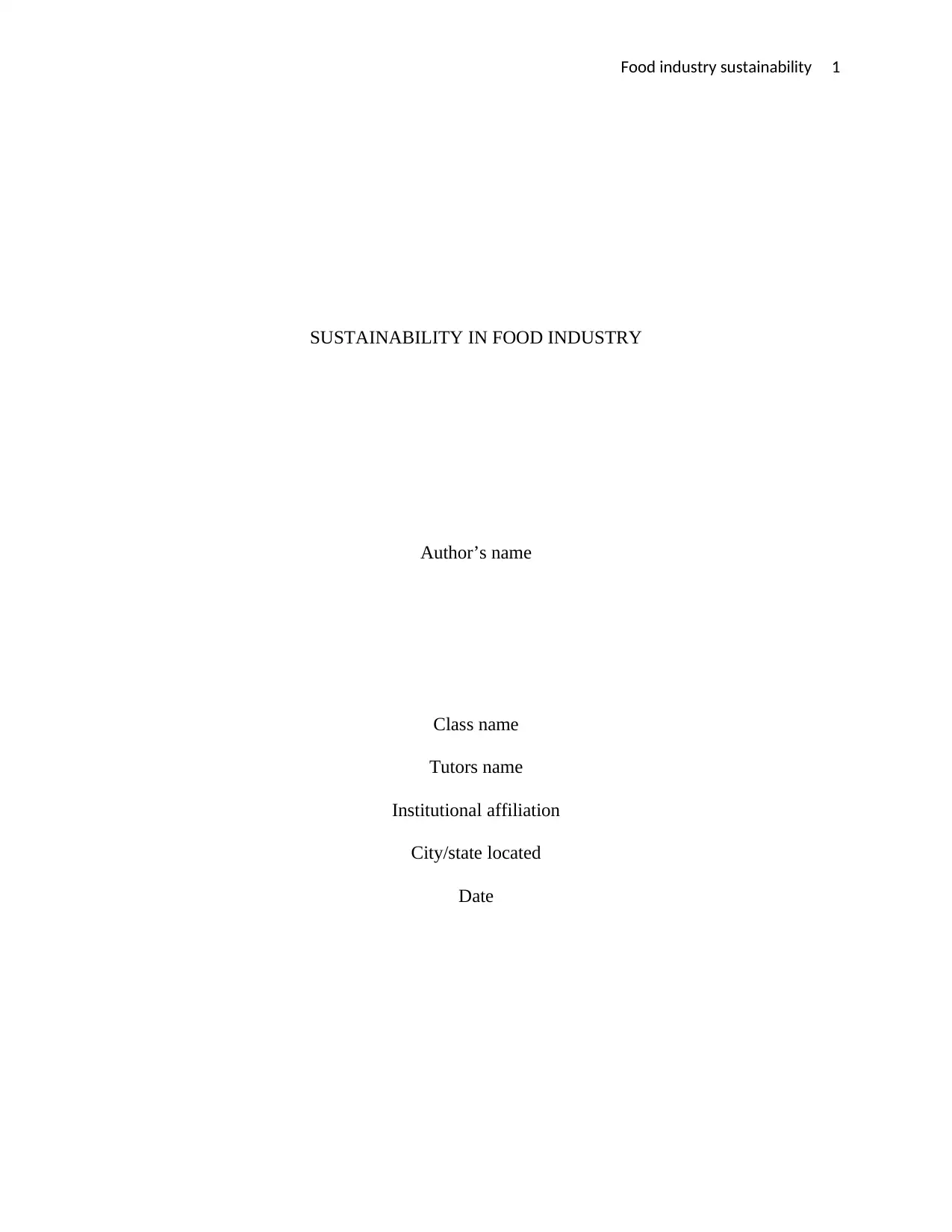
Food industry sustainability 1
SUSTAINABILITY IN FOOD INDUSTRY
Author’s name
Class name
Tutors name
Institutional affiliation
City/state located
Date
SUSTAINABILITY IN FOOD INDUSTRY
Author’s name
Class name
Tutors name
Institutional affiliation
City/state located
Date
Paraphrase This Document
Need a fresh take? Get an instant paraphrase of this document with our AI Paraphraser
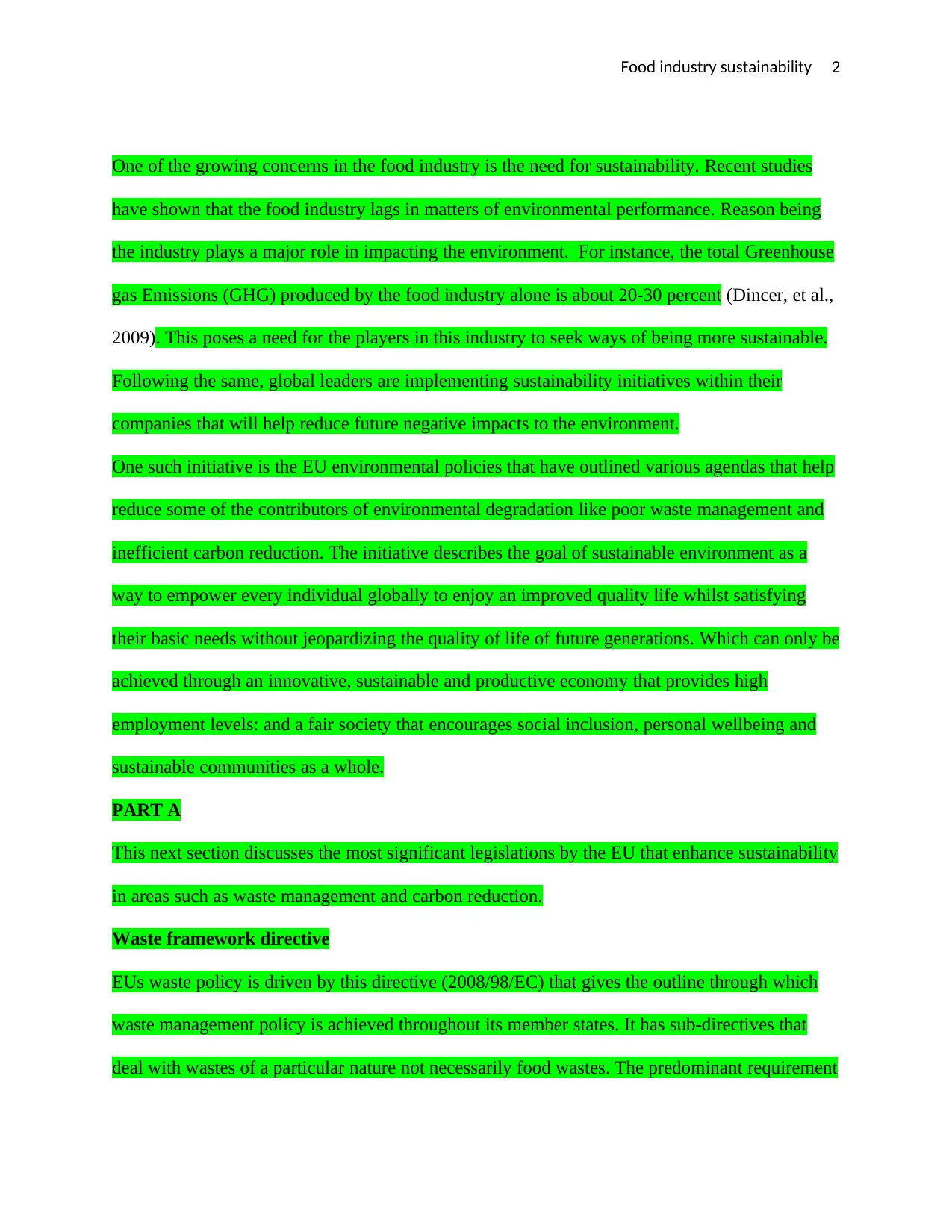
Food industry sustainability 2
One of the growing concerns in the food industry is the need for sustainability. Recent studies
have shown that the food industry lags in matters of environmental performance. Reason being
the industry plays a major role in impacting the environment. For instance, the total Greenhouse
gas Emissions (GHG) produced by the food industry alone is about 20-30 percent (Dincer, et al.,
2009). This poses a need for the players in this industry to seek ways of being more sustainable.
Following the same, global leaders are implementing sustainability initiatives within their
companies that will help reduce future negative impacts to the environment.
One such initiative is the EU environmental policies that have outlined various agendas that help
reduce some of the contributors of environmental degradation like poor waste management and
inefficient carbon reduction. The initiative describes the goal of sustainable environment as a
way to empower every individual globally to enjoy an improved quality life whilst satisfying
their basic needs without jeopardizing the quality of life of future generations. Which can only be
achieved through an innovative, sustainable and productive economy that provides high
employment levels: and a fair society that encourages social inclusion, personal wellbeing and
sustainable communities as a whole.
PART A
This next section discusses the most significant legislations by the EU that enhance sustainability
in areas such as waste management and carbon reduction.
Waste framework directive
EUs waste policy is driven by this directive (2008/98/EC) that gives the outline through which
waste management policy is achieved throughout its member states. It has sub-directives that
deal with wastes of a particular nature not necessarily food wastes. The predominant requirement
One of the growing concerns in the food industry is the need for sustainability. Recent studies
have shown that the food industry lags in matters of environmental performance. Reason being
the industry plays a major role in impacting the environment. For instance, the total Greenhouse
gas Emissions (GHG) produced by the food industry alone is about 20-30 percent (Dincer, et al.,
2009). This poses a need for the players in this industry to seek ways of being more sustainable.
Following the same, global leaders are implementing sustainability initiatives within their
companies that will help reduce future negative impacts to the environment.
One such initiative is the EU environmental policies that have outlined various agendas that help
reduce some of the contributors of environmental degradation like poor waste management and
inefficient carbon reduction. The initiative describes the goal of sustainable environment as a
way to empower every individual globally to enjoy an improved quality life whilst satisfying
their basic needs without jeopardizing the quality of life of future generations. Which can only be
achieved through an innovative, sustainable and productive economy that provides high
employment levels: and a fair society that encourages social inclusion, personal wellbeing and
sustainable communities as a whole.
PART A
This next section discusses the most significant legislations by the EU that enhance sustainability
in areas such as waste management and carbon reduction.
Waste framework directive
EUs waste policy is driven by this directive (2008/98/EC) that gives the outline through which
waste management policy is achieved throughout its member states. It has sub-directives that
deal with wastes of a particular nature not necessarily food wastes. The predominant requirement
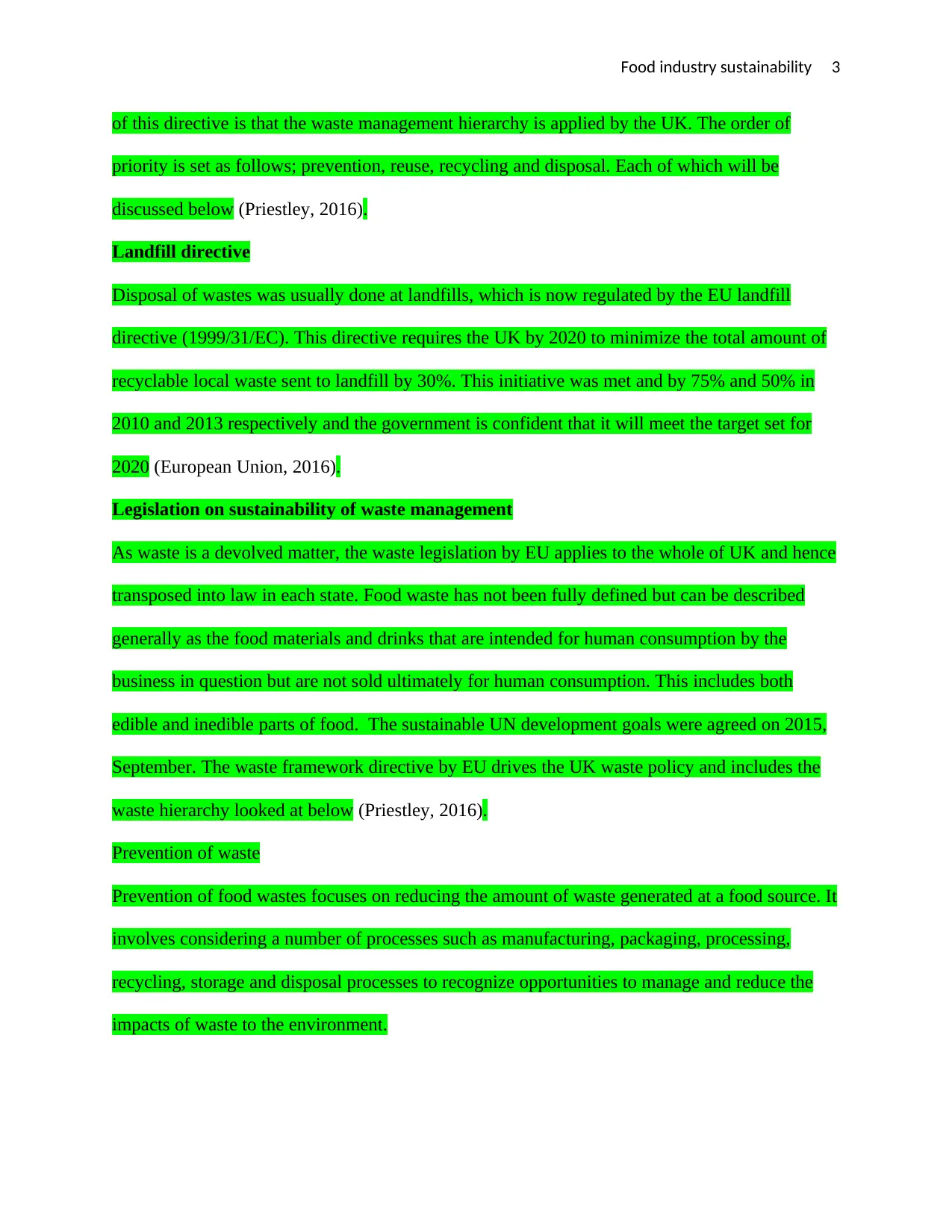
Food industry sustainability 3
of this directive is that the waste management hierarchy is applied by the UK. The order of
priority is set as follows; prevention, reuse, recycling and disposal. Each of which will be
discussed below (Priestley, 2016).
Landfill directive
Disposal of wastes was usually done at landfills, which is now regulated by the EU landfill
directive (1999/31/EC). This directive requires the UK by 2020 to minimize the total amount of
recyclable local waste sent to landfill by 30%. This initiative was met and by 75% and 50% in
2010 and 2013 respectively and the government is confident that it will meet the target set for
2020 (European Union, 2016).
Legislation on sustainability of waste management
As waste is a devolved matter, the waste legislation by EU applies to the whole of UK and hence
transposed into law in each state. Food waste has not been fully defined but can be described
generally as the food materials and drinks that are intended for human consumption by the
business in question but are not sold ultimately for human consumption. This includes both
edible and inedible parts of food. The sustainable UN development goals were agreed on 2015,
September. The waste framework directive by EU drives the UK waste policy and includes the
waste hierarchy looked at below (Priestley, 2016).
Prevention of waste
Prevention of food wastes focuses on reducing the amount of waste generated at a food source. It
involves considering a number of processes such as manufacturing, packaging, processing,
recycling, storage and disposal processes to recognize opportunities to manage and reduce the
impacts of waste to the environment.
of this directive is that the waste management hierarchy is applied by the UK. The order of
priority is set as follows; prevention, reuse, recycling and disposal. Each of which will be
discussed below (Priestley, 2016).
Landfill directive
Disposal of wastes was usually done at landfills, which is now regulated by the EU landfill
directive (1999/31/EC). This directive requires the UK by 2020 to minimize the total amount of
recyclable local waste sent to landfill by 30%. This initiative was met and by 75% and 50% in
2010 and 2013 respectively and the government is confident that it will meet the target set for
2020 (European Union, 2016).
Legislation on sustainability of waste management
As waste is a devolved matter, the waste legislation by EU applies to the whole of UK and hence
transposed into law in each state. Food waste has not been fully defined but can be described
generally as the food materials and drinks that are intended for human consumption by the
business in question but are not sold ultimately for human consumption. This includes both
edible and inedible parts of food. The sustainable UN development goals were agreed on 2015,
September. The waste framework directive by EU drives the UK waste policy and includes the
waste hierarchy looked at below (Priestley, 2016).
Prevention of waste
Prevention of food wastes focuses on reducing the amount of waste generated at a food source. It
involves considering a number of processes such as manufacturing, packaging, processing,
recycling, storage and disposal processes to recognize opportunities to manage and reduce the
impacts of waste to the environment.
⊘ This is a preview!⊘
Do you want full access?
Subscribe today to unlock all pages.

Trusted by 1+ million students worldwide
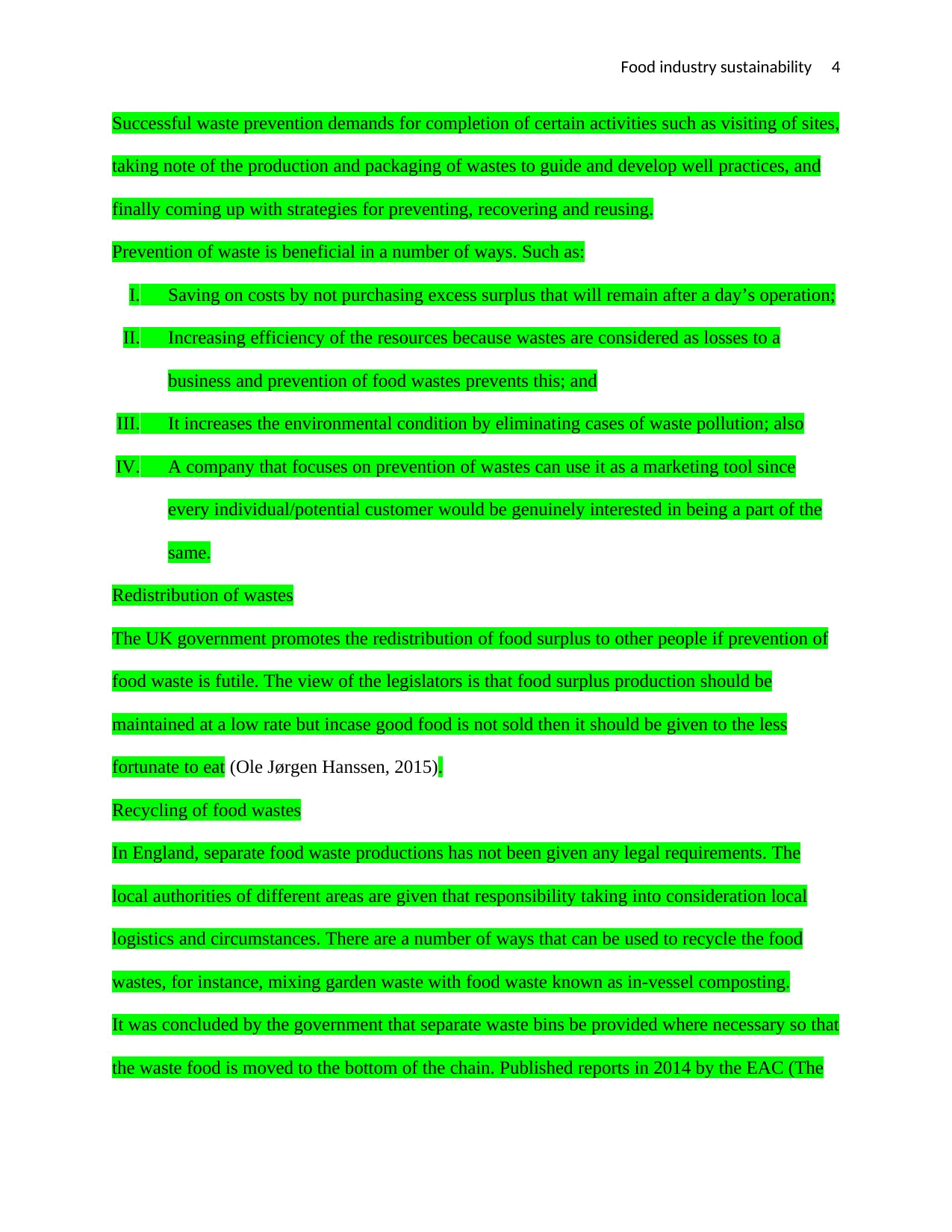
Food industry sustainability 4
Successful waste prevention demands for completion of certain activities such as visiting of sites,
taking note of the production and packaging of wastes to guide and develop well practices, and
finally coming up with strategies for preventing, recovering and reusing.
Prevention of waste is beneficial in a number of ways. Such as:
I. Saving on costs by not purchasing excess surplus that will remain after a day’s operation;
II. Increasing efficiency of the resources because wastes are considered as losses to a
business and prevention of food wastes prevents this; and
III. It increases the environmental condition by eliminating cases of waste pollution; also
IV. A company that focuses on prevention of wastes can use it as a marketing tool since
every individual/potential customer would be genuinely interested in being a part of the
same.
Redistribution of wastes
The UK government promotes the redistribution of food surplus to other people if prevention of
food waste is futile. The view of the legislators is that food surplus production should be
maintained at a low rate but incase good food is not sold then it should be given to the less
fortunate to eat (Ole Jørgen Hanssen, 2015).
Recycling of food wastes
In England, separate food waste productions has not been given any legal requirements. The
local authorities of different areas are given that responsibility taking into consideration local
logistics and circumstances. There are a number of ways that can be used to recycle the food
wastes, for instance, mixing garden waste with food waste known as in-vessel composting.
It was concluded by the government that separate waste bins be provided where necessary so that
the waste food is moved to the bottom of the chain. Published reports in 2014 by the EAC (The
Successful waste prevention demands for completion of certain activities such as visiting of sites,
taking note of the production and packaging of wastes to guide and develop well practices, and
finally coming up with strategies for preventing, recovering and reusing.
Prevention of waste is beneficial in a number of ways. Such as:
I. Saving on costs by not purchasing excess surplus that will remain after a day’s operation;
II. Increasing efficiency of the resources because wastes are considered as losses to a
business and prevention of food wastes prevents this; and
III. It increases the environmental condition by eliminating cases of waste pollution; also
IV. A company that focuses on prevention of wastes can use it as a marketing tool since
every individual/potential customer would be genuinely interested in being a part of the
same.
Redistribution of wastes
The UK government promotes the redistribution of food surplus to other people if prevention of
food waste is futile. The view of the legislators is that food surplus production should be
maintained at a low rate but incase good food is not sold then it should be given to the less
fortunate to eat (Ole Jørgen Hanssen, 2015).
Recycling of food wastes
In England, separate food waste productions has not been given any legal requirements. The
local authorities of different areas are given that responsibility taking into consideration local
logistics and circumstances. There are a number of ways that can be used to recycle the food
wastes, for instance, mixing garden waste with food waste known as in-vessel composting.
It was concluded by the government that separate waste bins be provided where necessary so that
the waste food is moved to the bottom of the chain. Published reports in 2014 by the EAC (The
Paraphrase This Document
Need a fresh take? Get an instant paraphrase of this document with our AI Paraphraser
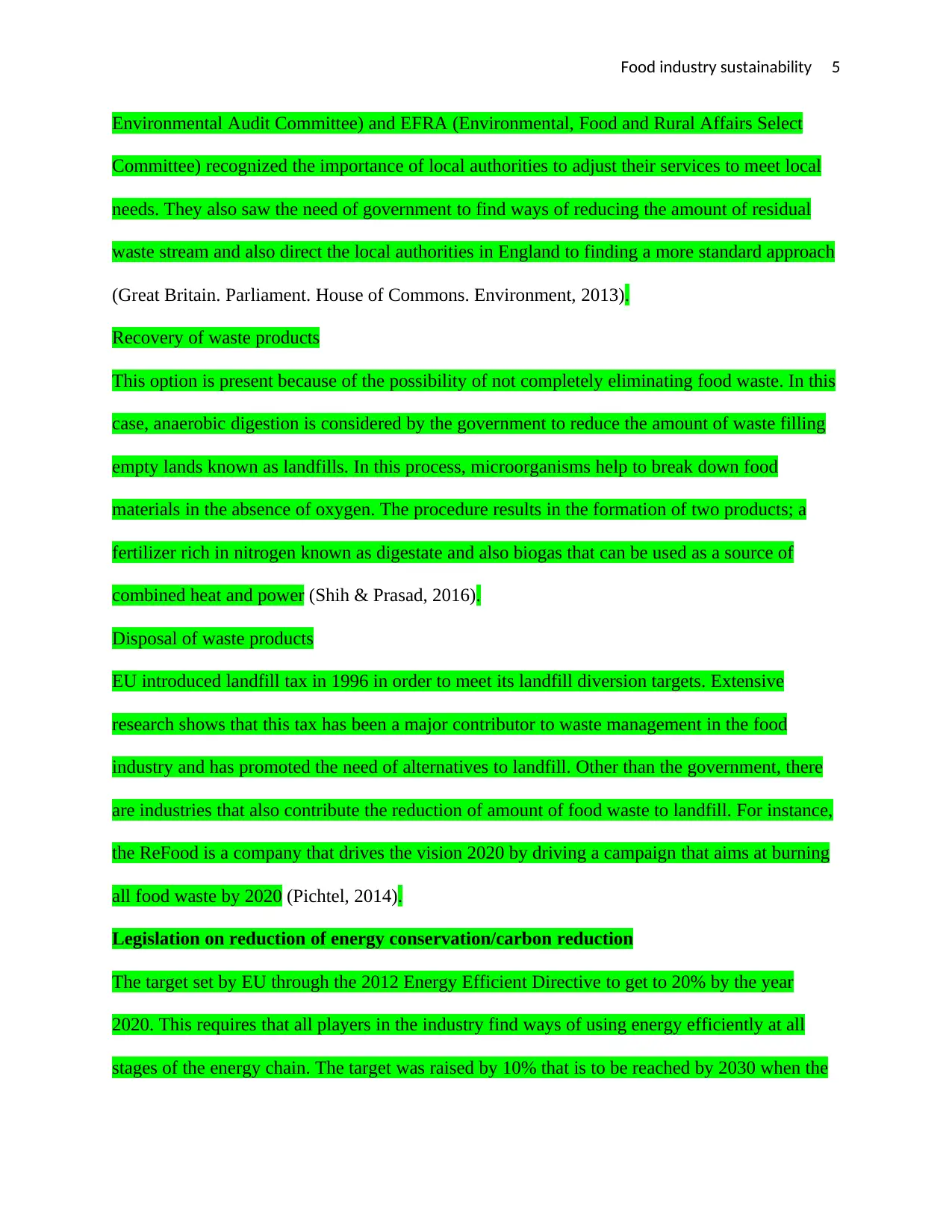
Food industry sustainability 5
Environmental Audit Committee) and EFRA (Environmental, Food and Rural Affairs Select
Committee) recognized the importance of local authorities to adjust their services to meet local
needs. They also saw the need of government to find ways of reducing the amount of residual
waste stream and also direct the local authorities in England to finding a more standard approach
(Great Britain. Parliament. House of Commons. Environment, 2013).
Recovery of waste products
This option is present because of the possibility of not completely eliminating food waste. In this
case, anaerobic digestion is considered by the government to reduce the amount of waste filling
empty lands known as landfills. In this process, microorganisms help to break down food
materials in the absence of oxygen. The procedure results in the formation of two products; a
fertilizer rich in nitrogen known as digestate and also biogas that can be used as a source of
combined heat and power (Shih & Prasad, 2016).
Disposal of waste products
EU introduced landfill tax in 1996 in order to meet its landfill diversion targets. Extensive
research shows that this tax has been a major contributor to waste management in the food
industry and has promoted the need of alternatives to landfill. Other than the government, there
are industries that also contribute the reduction of amount of food waste to landfill. For instance,
the ReFood is a company that drives the vision 2020 by driving a campaign that aims at burning
all food waste by 2020 (Pichtel, 2014).
Legislation on reduction of energy conservation/carbon reduction
The target set by EU through the 2012 Energy Efficient Directive to get to 20% by the year
2020. This requires that all players in the industry find ways of using energy efficiently at all
stages of the energy chain. The target was raised by 10% that is to be reached by 2030 when the
Environmental Audit Committee) and EFRA (Environmental, Food and Rural Affairs Select
Committee) recognized the importance of local authorities to adjust their services to meet local
needs. They also saw the need of government to find ways of reducing the amount of residual
waste stream and also direct the local authorities in England to finding a more standard approach
(Great Britain. Parliament. House of Commons. Environment, 2013).
Recovery of waste products
This option is present because of the possibility of not completely eliminating food waste. In this
case, anaerobic digestion is considered by the government to reduce the amount of waste filling
empty lands known as landfills. In this process, microorganisms help to break down food
materials in the absence of oxygen. The procedure results in the formation of two products; a
fertilizer rich in nitrogen known as digestate and also biogas that can be used as a source of
combined heat and power (Shih & Prasad, 2016).
Disposal of waste products
EU introduced landfill tax in 1996 in order to meet its landfill diversion targets. Extensive
research shows that this tax has been a major contributor to waste management in the food
industry and has promoted the need of alternatives to landfill. Other than the government, there
are industries that also contribute the reduction of amount of food waste to landfill. For instance,
the ReFood is a company that drives the vision 2020 by driving a campaign that aims at burning
all food waste by 2020 (Pichtel, 2014).
Legislation on reduction of energy conservation/carbon reduction
The target set by EU through the 2012 Energy Efficient Directive to get to 20% by the year
2020. This requires that all players in the industry find ways of using energy efficiently at all
stages of the energy chain. The target was raised by 10% that is to be reached by 2030 when the
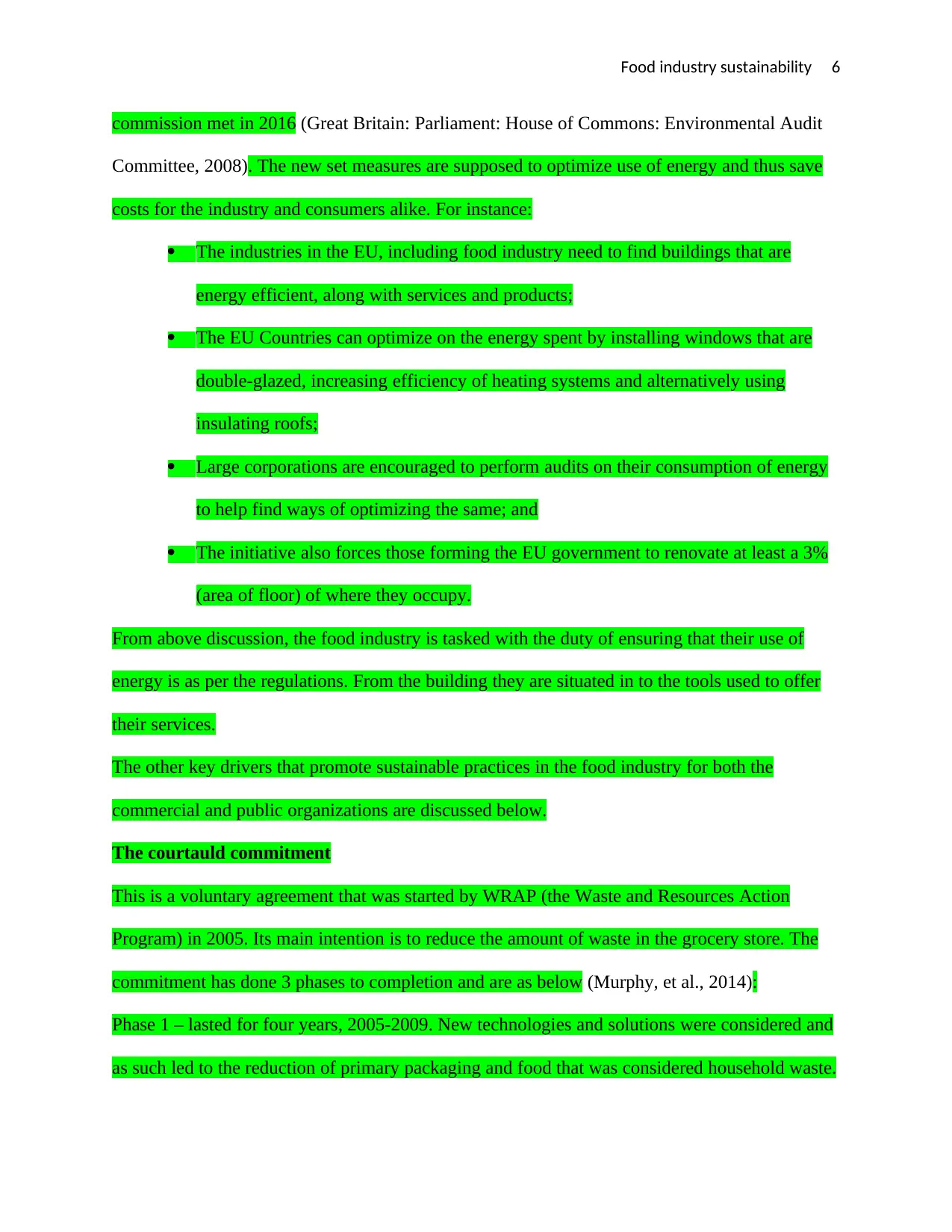
Food industry sustainability 6
commission met in 2016 (Great Britain: Parliament: House of Commons: Environmental Audit
Committee, 2008). The new set measures are supposed to optimize use of energy and thus save
costs for the industry and consumers alike. For instance:
The industries in the EU, including food industry need to find buildings that are
energy efficient, along with services and products;
The EU Countries can optimize on the energy spent by installing windows that are
double-glazed, increasing efficiency of heating systems and alternatively using
insulating roofs;
Large corporations are encouraged to perform audits on their consumption of energy
to help find ways of optimizing the same; and
The initiative also forces those forming the EU government to renovate at least a 3%
(area of floor) of where they occupy.
From above discussion, the food industry is tasked with the duty of ensuring that their use of
energy is as per the regulations. From the building they are situated in to the tools used to offer
their services.
The other key drivers that promote sustainable practices in the food industry for both the
commercial and public organizations are discussed below.
The courtauld commitment
This is a voluntary agreement that was started by WRAP (the Waste and Resources Action
Program) in 2005. Its main intention is to reduce the amount of waste in the grocery store. The
commitment has done 3 phases to completion and are as below (Murphy, et al., 2014):
Phase 1 – lasted for four years, 2005-2009. New technologies and solutions were considered and
as such led to the reduction of primary packaging and food that was considered household waste.
commission met in 2016 (Great Britain: Parliament: House of Commons: Environmental Audit
Committee, 2008). The new set measures are supposed to optimize use of energy and thus save
costs for the industry and consumers alike. For instance:
The industries in the EU, including food industry need to find buildings that are
energy efficient, along with services and products;
The EU Countries can optimize on the energy spent by installing windows that are
double-glazed, increasing efficiency of heating systems and alternatively using
insulating roofs;
Large corporations are encouraged to perform audits on their consumption of energy
to help find ways of optimizing the same; and
The initiative also forces those forming the EU government to renovate at least a 3%
(area of floor) of where they occupy.
From above discussion, the food industry is tasked with the duty of ensuring that their use of
energy is as per the regulations. From the building they are situated in to the tools used to offer
their services.
The other key drivers that promote sustainable practices in the food industry for both the
commercial and public organizations are discussed below.
The courtauld commitment
This is a voluntary agreement that was started by WRAP (the Waste and Resources Action
Program) in 2005. Its main intention is to reduce the amount of waste in the grocery store. The
commitment has done 3 phases to completion and are as below (Murphy, et al., 2014):
Phase 1 – lasted for four years, 2005-2009. New technologies and solutions were considered and
as such led to the reduction of primary packaging and food that was considered household waste.
⊘ This is a preview!⊘
Do you want full access?
Subscribe today to unlock all pages.

Trusted by 1+ million students worldwide
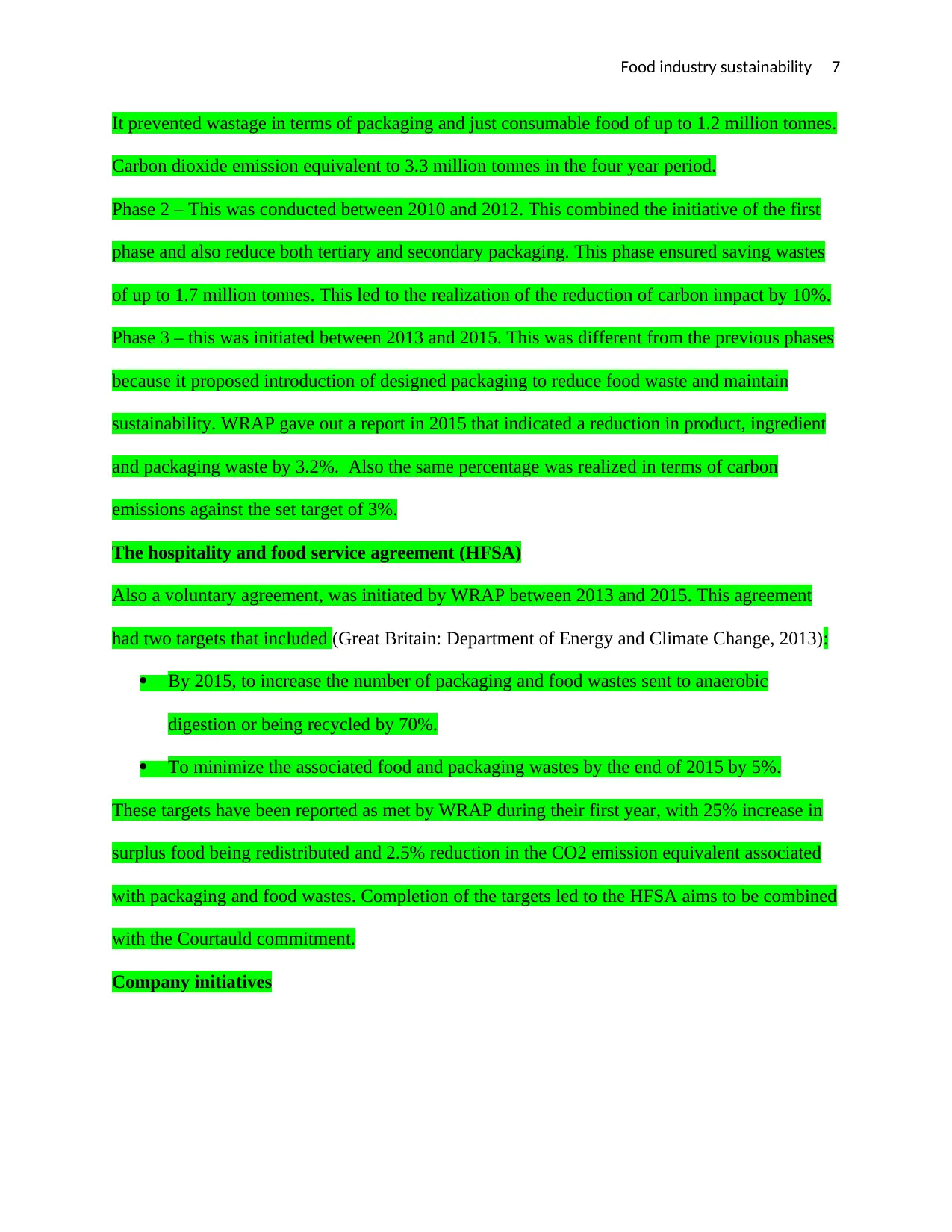
Food industry sustainability 7
It prevented wastage in terms of packaging and just consumable food of up to 1.2 million tonnes.
Carbon dioxide emission equivalent to 3.3 million tonnes in the four year period.
Phase 2 – This was conducted between 2010 and 2012. This combined the initiative of the first
phase and also reduce both tertiary and secondary packaging. This phase ensured saving wastes
of up to 1.7 million tonnes. This led to the realization of the reduction of carbon impact by 10%.
Phase 3 – this was initiated between 2013 and 2015. This was different from the previous phases
because it proposed introduction of designed packaging to reduce food waste and maintain
sustainability. WRAP gave out a report in 2015 that indicated a reduction in product, ingredient
and packaging waste by 3.2%. Also the same percentage was realized in terms of carbon
emissions against the set target of 3%.
The hospitality and food service agreement (HFSA)
Also a voluntary agreement, was initiated by WRAP between 2013 and 2015. This agreement
had two targets that included (Great Britain: Department of Energy and Climate Change, 2013):
By 2015, to increase the number of packaging and food wastes sent to anaerobic
digestion or being recycled by 70%.
To minimize the associated food and packaging wastes by the end of 2015 by 5%.
These targets have been reported as met by WRAP during their first year, with 25% increase in
surplus food being redistributed and 2.5% reduction in the CO2 emission equivalent associated
with packaging and food wastes. Completion of the targets led to the HFSA aims to be combined
with the Courtauld commitment.
Company initiatives
It prevented wastage in terms of packaging and just consumable food of up to 1.2 million tonnes.
Carbon dioxide emission equivalent to 3.3 million tonnes in the four year period.
Phase 2 – This was conducted between 2010 and 2012. This combined the initiative of the first
phase and also reduce both tertiary and secondary packaging. This phase ensured saving wastes
of up to 1.7 million tonnes. This led to the realization of the reduction of carbon impact by 10%.
Phase 3 – this was initiated between 2013 and 2015. This was different from the previous phases
because it proposed introduction of designed packaging to reduce food waste and maintain
sustainability. WRAP gave out a report in 2015 that indicated a reduction in product, ingredient
and packaging waste by 3.2%. Also the same percentage was realized in terms of carbon
emissions against the set target of 3%.
The hospitality and food service agreement (HFSA)
Also a voluntary agreement, was initiated by WRAP between 2013 and 2015. This agreement
had two targets that included (Great Britain: Department of Energy and Climate Change, 2013):
By 2015, to increase the number of packaging and food wastes sent to anaerobic
digestion or being recycled by 70%.
To minimize the associated food and packaging wastes by the end of 2015 by 5%.
These targets have been reported as met by WRAP during their first year, with 25% increase in
surplus food being redistributed and 2.5% reduction in the CO2 emission equivalent associated
with packaging and food wastes. Completion of the targets led to the HFSA aims to be combined
with the Courtauld commitment.
Company initiatives
Paraphrase This Document
Need a fresh take? Get an instant paraphrase of this document with our AI Paraphraser
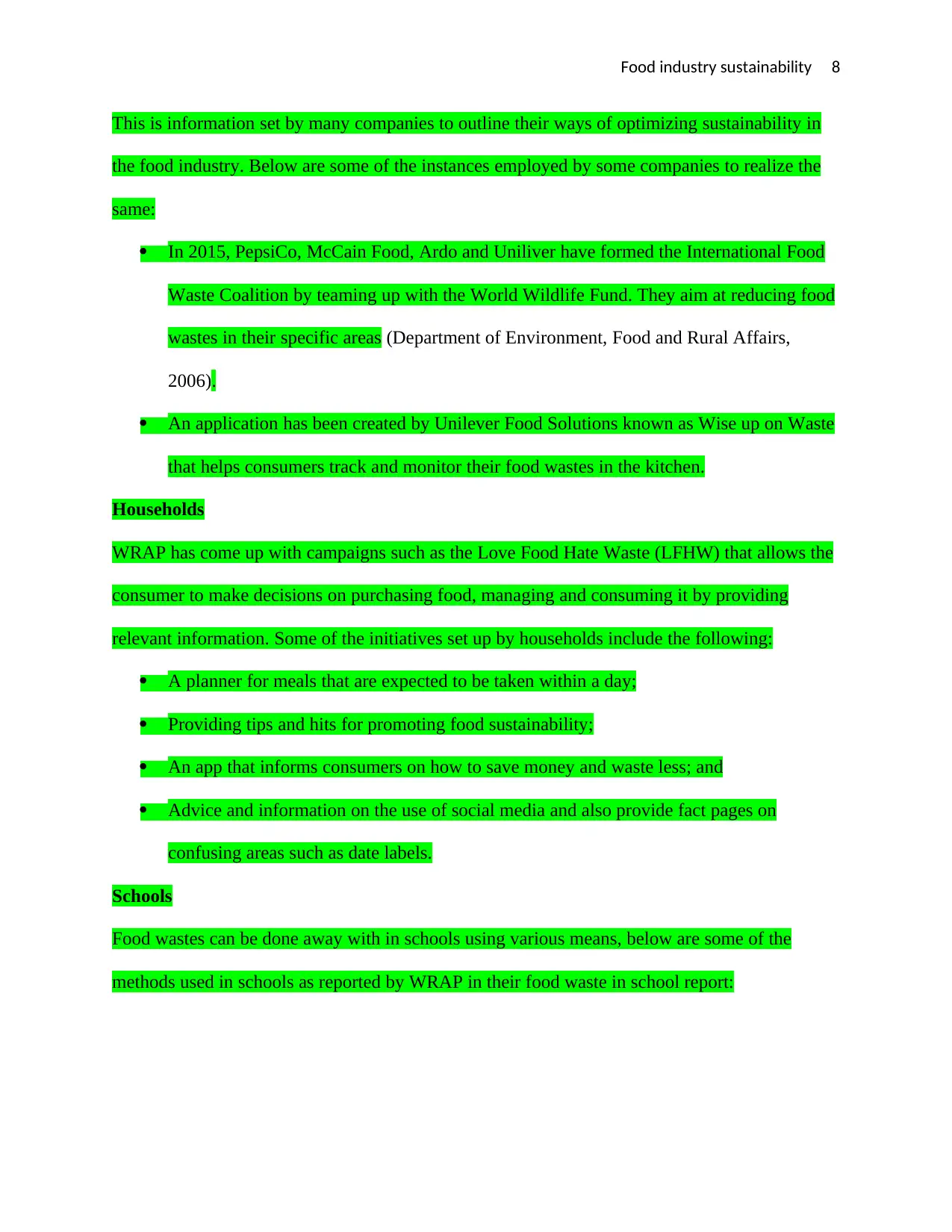
Food industry sustainability 8
This is information set by many companies to outline their ways of optimizing sustainability in
the food industry. Below are some of the instances employed by some companies to realize the
same:
In 2015, PepsiCo, McCain Food, Ardo and Uniliver have formed the International Food
Waste Coalition by teaming up with the World Wildlife Fund. They aim at reducing food
wastes in their specific areas (Department of Environment, Food and Rural Affairs,
2006).
An application has been created by Unilever Food Solutions known as Wise up on Waste
that helps consumers track and monitor their food wastes in the kitchen.
Households
WRAP has come up with campaigns such as the Love Food Hate Waste (LFHW) that allows the
consumer to make decisions on purchasing food, managing and consuming it by providing
relevant information. Some of the initiatives set up by households include the following:
A planner for meals that are expected to be taken within a day;
Providing tips and hits for promoting food sustainability;
An app that informs consumers on how to save money and waste less; and
Advice and information on the use of social media and also provide fact pages on
confusing areas such as date labels.
Schools
Food wastes can be done away with in schools using various means, below are some of the
methods used in schools as reported by WRAP in their food waste in school report:
This is information set by many companies to outline their ways of optimizing sustainability in
the food industry. Below are some of the instances employed by some companies to realize the
same:
In 2015, PepsiCo, McCain Food, Ardo and Uniliver have formed the International Food
Waste Coalition by teaming up with the World Wildlife Fund. They aim at reducing food
wastes in their specific areas (Department of Environment, Food and Rural Affairs,
2006).
An application has been created by Unilever Food Solutions known as Wise up on Waste
that helps consumers track and monitor their food wastes in the kitchen.
Households
WRAP has come up with campaigns such as the Love Food Hate Waste (LFHW) that allows the
consumer to make decisions on purchasing food, managing and consuming it by providing
relevant information. Some of the initiatives set up by households include the following:
A planner for meals that are expected to be taken within a day;
Providing tips and hits for promoting food sustainability;
An app that informs consumers on how to save money and waste less; and
Advice and information on the use of social media and also provide fact pages on
confusing areas such as date labels.
Schools
Food wastes can be done away with in schools using various means, below are some of the
methods used in schools as reported by WRAP in their food waste in school report:
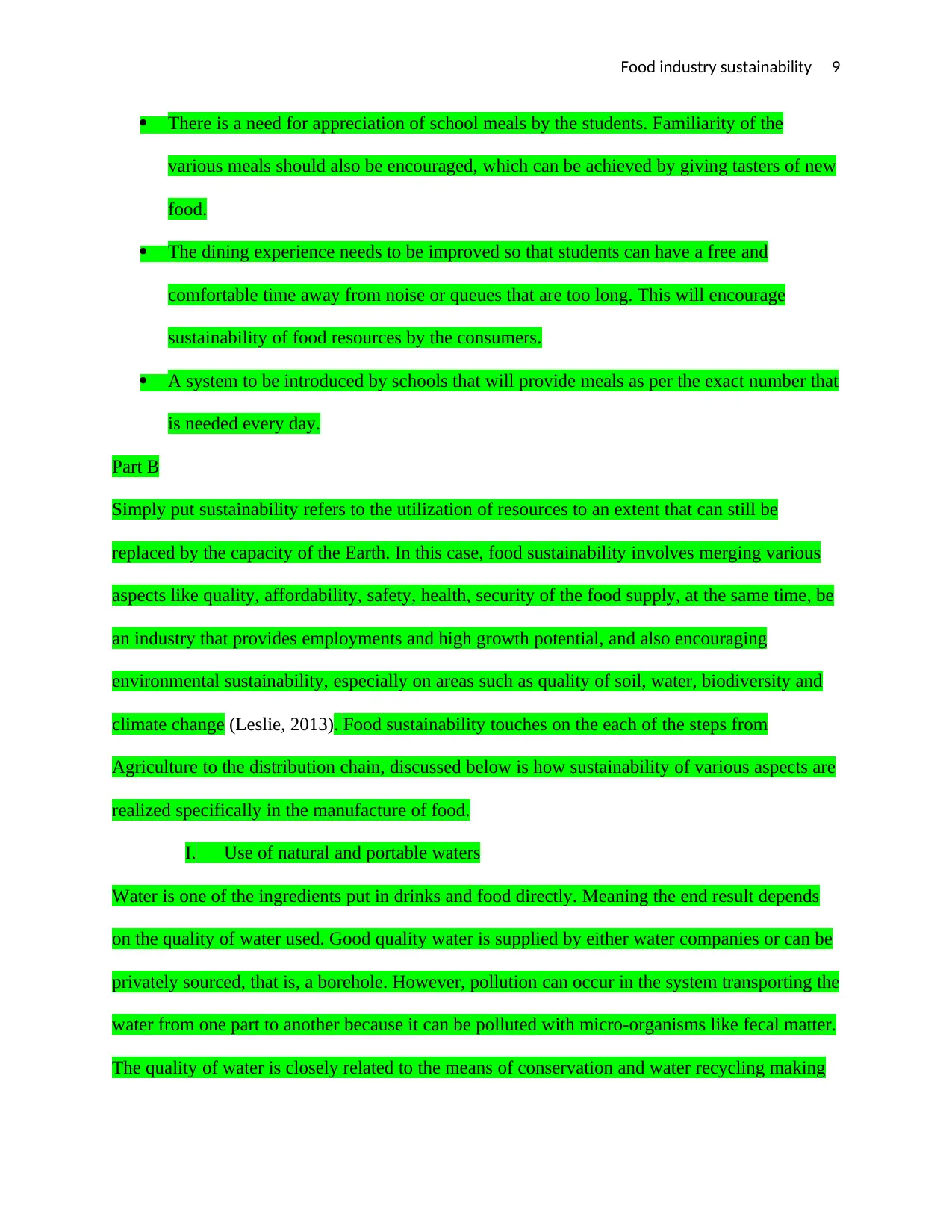
Food industry sustainability 9
There is a need for appreciation of school meals by the students. Familiarity of the
various meals should also be encouraged, which can be achieved by giving tasters of new
food.
The dining experience needs to be improved so that students can have a free and
comfortable time away from noise or queues that are too long. This will encourage
sustainability of food resources by the consumers.
A system to be introduced by schools that will provide meals as per the exact number that
is needed every day.
Part B
Simply put sustainability refers to the utilization of resources to an extent that can still be
replaced by the capacity of the Earth. In this case, food sustainability involves merging various
aspects like quality, affordability, safety, health, security of the food supply, at the same time, be
an industry that provides employments and high growth potential, and also encouraging
environmental sustainability, especially on areas such as quality of soil, water, biodiversity and
climate change (Leslie, 2013). Food sustainability touches on the each of the steps from
Agriculture to the distribution chain, discussed below is how sustainability of various aspects are
realized specifically in the manufacture of food.
I. Use of natural and portable waters
Water is one of the ingredients put in drinks and food directly. Meaning the end result depends
on the quality of water used. Good quality water is supplied by either water companies or can be
privately sourced, that is, a borehole. However, pollution can occur in the system transporting the
water from one part to another because it can be polluted with micro-organisms like fecal matter.
The quality of water is closely related to the means of conservation and water recycling making
There is a need for appreciation of school meals by the students. Familiarity of the
various meals should also be encouraged, which can be achieved by giving tasters of new
food.
The dining experience needs to be improved so that students can have a free and
comfortable time away from noise or queues that are too long. This will encourage
sustainability of food resources by the consumers.
A system to be introduced by schools that will provide meals as per the exact number that
is needed every day.
Part B
Simply put sustainability refers to the utilization of resources to an extent that can still be
replaced by the capacity of the Earth. In this case, food sustainability involves merging various
aspects like quality, affordability, safety, health, security of the food supply, at the same time, be
an industry that provides employments and high growth potential, and also encouraging
environmental sustainability, especially on areas such as quality of soil, water, biodiversity and
climate change (Leslie, 2013). Food sustainability touches on the each of the steps from
Agriculture to the distribution chain, discussed below is how sustainability of various aspects are
realized specifically in the manufacture of food.
I. Use of natural and portable waters
Water is one of the ingredients put in drinks and food directly. Meaning the end result depends
on the quality of water used. Good quality water is supplied by either water companies or can be
privately sourced, that is, a borehole. However, pollution can occur in the system transporting the
water from one part to another because it can be polluted with micro-organisms like fecal matter.
The quality of water is closely related to the means of conservation and water recycling making
⊘ This is a preview!⊘
Do you want full access?
Subscribe today to unlock all pages.

Trusted by 1+ million students worldwide
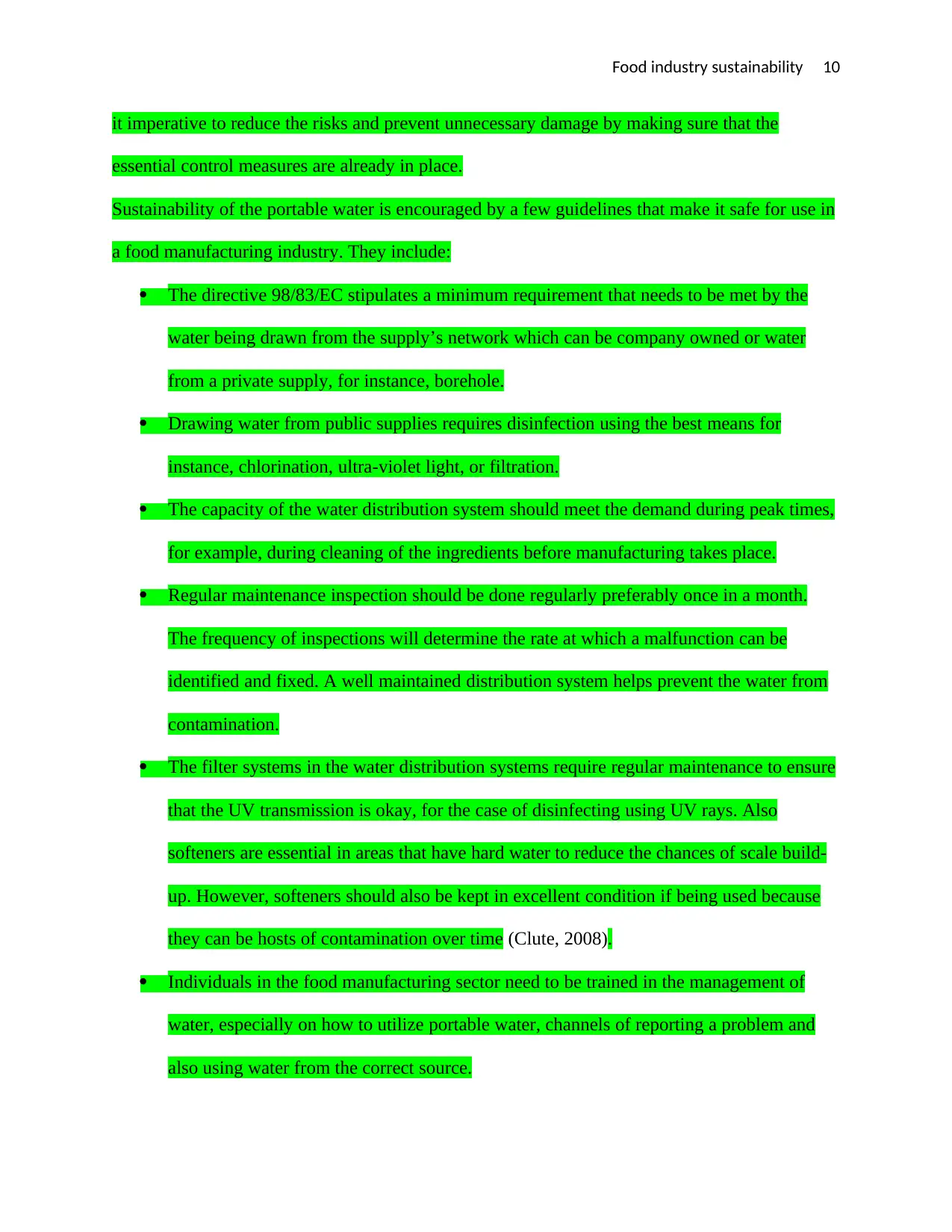
Food industry sustainability 10
it imperative to reduce the risks and prevent unnecessary damage by making sure that the
essential control measures are already in place.
Sustainability of the portable water is encouraged by a few guidelines that make it safe for use in
a food manufacturing industry. They include:
The directive 98/83/EC stipulates a minimum requirement that needs to be met by the
water being drawn from the supply’s network which can be company owned or water
from a private supply, for instance, borehole.
Drawing water from public supplies requires disinfection using the best means for
instance, chlorination, ultra-violet light, or filtration.
The capacity of the water distribution system should meet the demand during peak times,
for example, during cleaning of the ingredients before manufacturing takes place.
Regular maintenance inspection should be done regularly preferably once in a month.
The frequency of inspections will determine the rate at which a malfunction can be
identified and fixed. A well maintained distribution system helps prevent the water from
contamination.
The filter systems in the water distribution systems require regular maintenance to ensure
that the UV transmission is okay, for the case of disinfecting using UV rays. Also
softeners are essential in areas that have hard water to reduce the chances of scale build-
up. However, softeners should also be kept in excellent condition if being used because
they can be hosts of contamination over time (Clute, 2008).
Individuals in the food manufacturing sector need to be trained in the management of
water, especially on how to utilize portable water, channels of reporting a problem and
also using water from the correct source.
it imperative to reduce the risks and prevent unnecessary damage by making sure that the
essential control measures are already in place.
Sustainability of the portable water is encouraged by a few guidelines that make it safe for use in
a food manufacturing industry. They include:
The directive 98/83/EC stipulates a minimum requirement that needs to be met by the
water being drawn from the supply’s network which can be company owned or water
from a private supply, for instance, borehole.
Drawing water from public supplies requires disinfection using the best means for
instance, chlorination, ultra-violet light, or filtration.
The capacity of the water distribution system should meet the demand during peak times,
for example, during cleaning of the ingredients before manufacturing takes place.
Regular maintenance inspection should be done regularly preferably once in a month.
The frequency of inspections will determine the rate at which a malfunction can be
identified and fixed. A well maintained distribution system helps prevent the water from
contamination.
The filter systems in the water distribution systems require regular maintenance to ensure
that the UV transmission is okay, for the case of disinfecting using UV rays. Also
softeners are essential in areas that have hard water to reduce the chances of scale build-
up. However, softeners should also be kept in excellent condition if being used because
they can be hosts of contamination over time (Clute, 2008).
Individuals in the food manufacturing sector need to be trained in the management of
water, especially on how to utilize portable water, channels of reporting a problem and
also using water from the correct source.
Paraphrase This Document
Need a fresh take? Get an instant paraphrase of this document with our AI Paraphraser
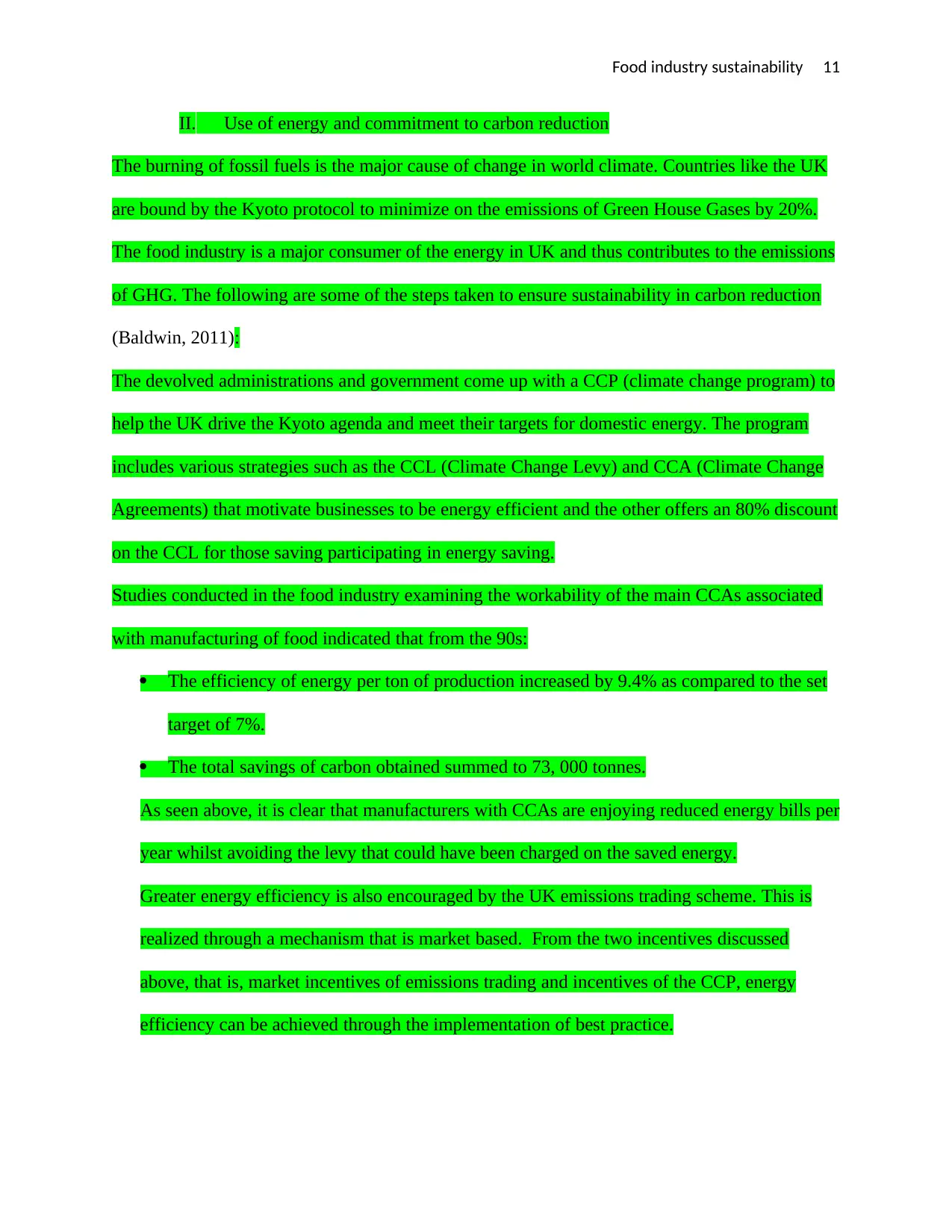
Food industry sustainability 11
II. Use of energy and commitment to carbon reduction
The burning of fossil fuels is the major cause of change in world climate. Countries like the UK
are bound by the Kyoto protocol to minimize on the emissions of Green House Gases by 20%.
The food industry is a major consumer of the energy in UK and thus contributes to the emissions
of GHG. The following are some of the steps taken to ensure sustainability in carbon reduction
(Baldwin, 2011):
The devolved administrations and government come up with a CCP (climate change program) to
help the UK drive the Kyoto agenda and meet their targets for domestic energy. The program
includes various strategies such as the CCL (Climate Change Levy) and CCA (Climate Change
Agreements) that motivate businesses to be energy efficient and the other offers an 80% discount
on the CCL for those saving participating in energy saving.
Studies conducted in the food industry examining the workability of the main CCAs associated
with manufacturing of food indicated that from the 90s:
The efficiency of energy per ton of production increased by 9.4% as compared to the set
target of 7%.
The total savings of carbon obtained summed to 73, 000 tonnes.
As seen above, it is clear that manufacturers with CCAs are enjoying reduced energy bills per
year whilst avoiding the levy that could have been charged on the saved energy.
Greater energy efficiency is also encouraged by the UK emissions trading scheme. This is
realized through a mechanism that is market based. From the two incentives discussed
above, that is, market incentives of emissions trading and incentives of the CCP, energy
efficiency can be achieved through the implementation of best practice.
II. Use of energy and commitment to carbon reduction
The burning of fossil fuels is the major cause of change in world climate. Countries like the UK
are bound by the Kyoto protocol to minimize on the emissions of Green House Gases by 20%.
The food industry is a major consumer of the energy in UK and thus contributes to the emissions
of GHG. The following are some of the steps taken to ensure sustainability in carbon reduction
(Baldwin, 2011):
The devolved administrations and government come up with a CCP (climate change program) to
help the UK drive the Kyoto agenda and meet their targets for domestic energy. The program
includes various strategies such as the CCL (Climate Change Levy) and CCA (Climate Change
Agreements) that motivate businesses to be energy efficient and the other offers an 80% discount
on the CCL for those saving participating in energy saving.
Studies conducted in the food industry examining the workability of the main CCAs associated
with manufacturing of food indicated that from the 90s:
The efficiency of energy per ton of production increased by 9.4% as compared to the set
target of 7%.
The total savings of carbon obtained summed to 73, 000 tonnes.
As seen above, it is clear that manufacturers with CCAs are enjoying reduced energy bills per
year whilst avoiding the levy that could have been charged on the saved energy.
Greater energy efficiency is also encouraged by the UK emissions trading scheme. This is
realized through a mechanism that is market based. From the two incentives discussed
above, that is, market incentives of emissions trading and incentives of the CCP, energy
efficiency can be achieved through the implementation of best practice.
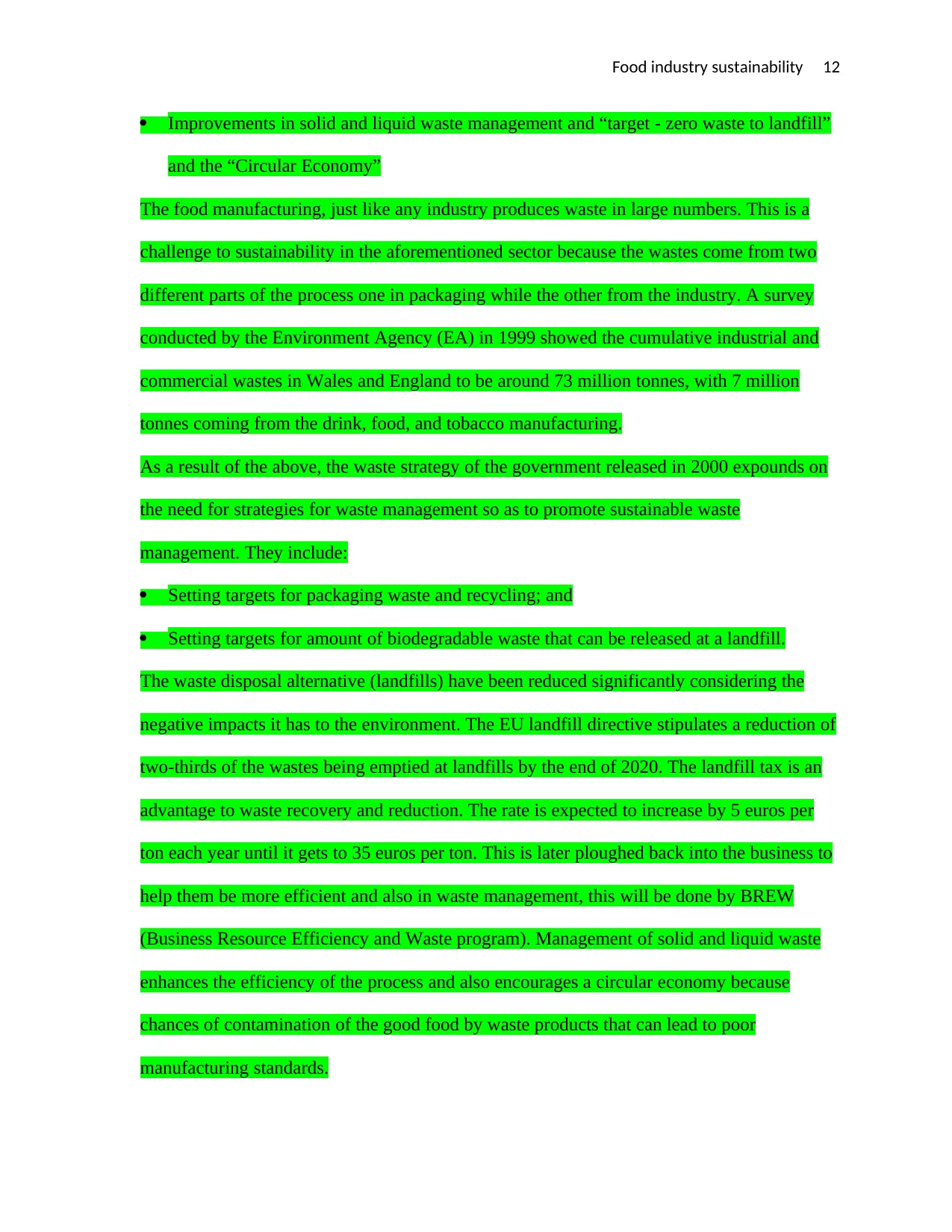
Food industry sustainability 12
Improvements in solid and liquid waste management and “target - zero waste to landfill”
and the “Circular Economy”
The food manufacturing, just like any industry produces waste in large numbers. This is a
challenge to sustainability in the aforementioned sector because the wastes come from two
different parts of the process one in packaging while the other from the industry. A survey
conducted by the Environment Agency (EA) in 1999 showed the cumulative industrial and
commercial wastes in Wales and England to be around 73 million tonnes, with 7 million
tonnes coming from the drink, food, and tobacco manufacturing.
As a result of the above, the waste strategy of the government released in 2000 expounds on
the need for strategies for waste management so as to promote sustainable waste
management. They include:
Setting targets for packaging waste and recycling; and
Setting targets for amount of biodegradable waste that can be released at a landfill.
The waste disposal alternative (landfills) have been reduced significantly considering the
negative impacts it has to the environment. The EU landfill directive stipulates a reduction of
two-thirds of the wastes being emptied at landfills by the end of 2020. The landfill tax is an
advantage to waste recovery and reduction. The rate is expected to increase by 5 euros per
ton each year until it gets to 35 euros per ton. This is later ploughed back into the business to
help them be more efficient and also in waste management, this will be done by BREW
(Business Resource Efficiency and Waste program). Management of solid and liquid waste
enhances the efficiency of the process and also encourages a circular economy because
chances of contamination of the good food by waste products that can lead to poor
manufacturing standards.
Improvements in solid and liquid waste management and “target - zero waste to landfill”
and the “Circular Economy”
The food manufacturing, just like any industry produces waste in large numbers. This is a
challenge to sustainability in the aforementioned sector because the wastes come from two
different parts of the process one in packaging while the other from the industry. A survey
conducted by the Environment Agency (EA) in 1999 showed the cumulative industrial and
commercial wastes in Wales and England to be around 73 million tonnes, with 7 million
tonnes coming from the drink, food, and tobacco manufacturing.
As a result of the above, the waste strategy of the government released in 2000 expounds on
the need for strategies for waste management so as to promote sustainable waste
management. They include:
Setting targets for packaging waste and recycling; and
Setting targets for amount of biodegradable waste that can be released at a landfill.
The waste disposal alternative (landfills) have been reduced significantly considering the
negative impacts it has to the environment. The EU landfill directive stipulates a reduction of
two-thirds of the wastes being emptied at landfills by the end of 2020. The landfill tax is an
advantage to waste recovery and reduction. The rate is expected to increase by 5 euros per
ton each year until it gets to 35 euros per ton. This is later ploughed back into the business to
help them be more efficient and also in waste management, this will be done by BREW
(Business Resource Efficiency and Waste program). Management of solid and liquid waste
enhances the efficiency of the process and also encourages a circular economy because
chances of contamination of the good food by waste products that can lead to poor
manufacturing standards.
⊘ This is a preview!⊘
Do you want full access?
Subscribe today to unlock all pages.

Trusted by 1+ million students worldwide
1 out of 14
Related Documents
Your All-in-One AI-Powered Toolkit for Academic Success.
+13062052269
info@desklib.com
Available 24*7 on WhatsApp / Email
![[object Object]](/_next/static/media/star-bottom.7253800d.svg)
Unlock your academic potential
Copyright © 2020–2025 A2Z Services. All Rights Reserved. Developed and managed by ZUCOL.




